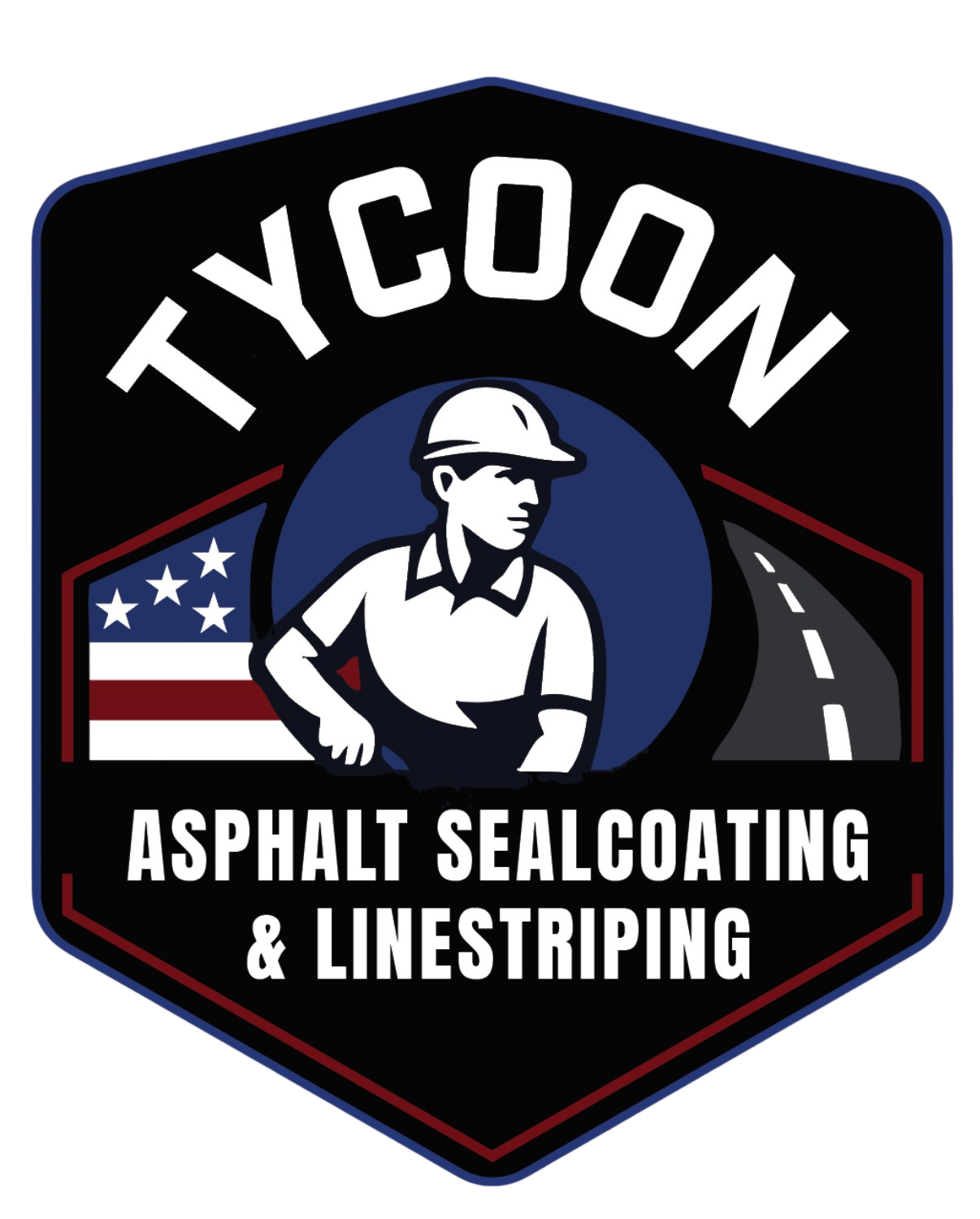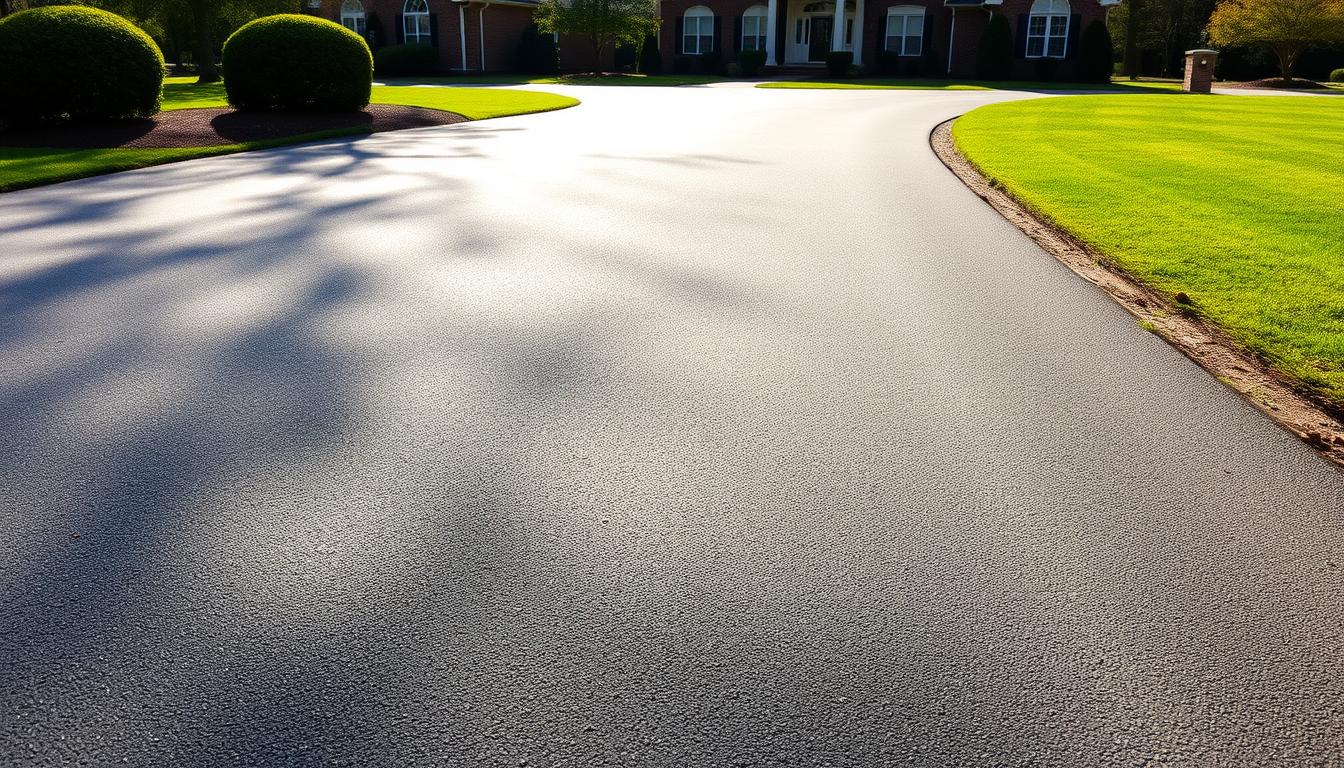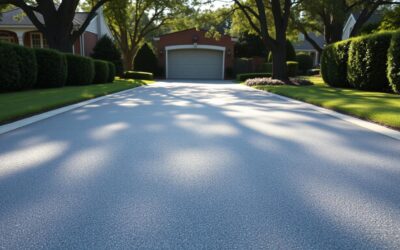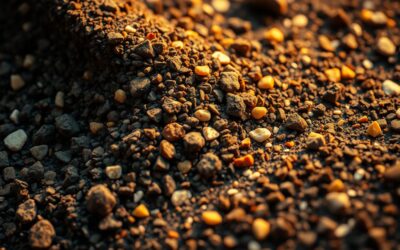We begin with a clear snapshot so you can judge a likely project range quickly. Nationally, a typical residential project averages about $4,996, with many jobs falling between roughly $3,086 and $7,912. Per square foot pricing commonly sits near $4–$6 for standard hot‑mix paving, while upgrades can add $12–$25 per square foot.
We explain the main factors that shape the final number: size, depth, base preparation, tonnage, access for crews, and optional finishes like stamped or heated systems. Deeper sections at garage entries and turnarounds use more material and add labor time.
Permits, grading, tree work, and drainage tie‑ins also raise the total. Labor rates typically run in the $40–$55 per hour range, and asphalt averages about $121 per ton. We’ll help you turn a footprint into a realistic estimate and point out maintenance steps that affect lifetime cost.
Charlotte, NC asphalt driveway costs at a glance
We’ll lay out the common price bands so you know what homeowners usually pay today.
Typical range and average total cost today
Most local installs land around $6–$9 per square foot. For a standard 600 square foot two‑car area, that equals roughly $3,600–$5,400 in total cost.
Lower‑end projects commonly run $3–$5 per square foot when site prep is minimal. Premium options — stamped, colored, or heated — jump to $10–$20+ per square foot.
What “per square foot” really looks like in Charlotte
Saying a job is $6 per square foot means materials, labor, and equipment are bundled into a simple per square number. That figure hides line items like excavation, base gravel, and edging.
Compare at a glance: concrete usually runs about $8–$11 per square foot, while gravel is $1–$3 per square foot. We recommend getting multiple bids from reputable companies to check costs per square and specific factors for your area.
asphalt driveway cost charlotte nc by size and per square foot
We’ll show common footprint examples and how thickness affects your per square figures.
Single-, double-, and larger layouts
Typical single‑car layouts run about 200–300 square foot, double cars 400–700 square foot, and larger or apron/turnaround areas exceed 1,200 square foot.
Installed prices often sit near $6–$9 per square foot for standard installs. Larger areas scale the materials and labor, shifting total spend accordingly.
How layer thickness changes the per square foot price
A 2‑inch surface uses roughly half the material of a 4‑inch layer, so per square pricing rises as thickness increases.
Thicker layers need more compaction passes and equipment time, which pushes the per‑square and total figures higher.
Tonnage math for easy budgeting
One ton covers about 80 square foot at 2 inches and about 40 square foot at 4 inches. Typical per‑ton pricing runs $92.50 low, $121 average, $150 high.
Examples: 300 sq ft ≈ 3.75 tons (2″) or 7.5 tons (4″). 640 sq ft ≈ 8 or 16 tons. 1,500 sq ft ≈ 18.75 or 37.5 tons. Use these to check supplier quotes.
Key factors that drive your total cost
Knowing the big factors that change a quote helps you choose the right trade-offs for your project. We focus on what contractors price and why bids can vary by thousands of dollars.
Driveway size, layout, and access for equipment
Size and shape set the work plan. Tight access or steep slopes forces crews to work slower and use smaller equipment, which raises the per square price and total cost.
Base and subgrade prep: grading, drainage, and substrate
Proper base work prevents failures. Adding a gravel substrate and compacting can add $0.50–$1.00 per square foot.
Major grading or slope correction typically runs $1,000–$6,000 and fixes water and rutting risks early.
Material type and surface options
Hot mix is standard; reclaimed lowers price; porous and specialty surfaces cost more. Stamped or colored finishes add about $12–$20 per square foot to the installation.
Labor rates and crew size in the local market
Labor for paving crews runs about $40–$55 per hour. Larger crews speed the job but raise hourly totals. Permits usually cost $50–$200 and curb or sidewalk tie-ins add coordination and fees.
Project types and what they typically cost
Different project types carry very different price bands, so matching scope to site condition saves money and time.
New construction vs. replacement
New construction and full replacement are the most invasive options. They usually run higher because they include excavation, base rebuild, and material removal.
Typical bands: new construction $7–$13 per square foot; replacement (with demo and removal) $8–$15 per square foot. Small demolition often adds about $250 plus disposal.
Resurfacing vs. repair: when each makes sense
Small repairs extend life at a low price. Minor patching or driveway repair typically costs $2–$5 per square foot.
Resurfacing or an overlay improves appearance and ride quality for sound bases. Resurfacing usually runs $5–$7 per square foot.
Use these rules: if the base is intact and cracks are limited, resurfacing offers strong value. If cracks are widespread or the substrate fails, choose replacement.
Example: a standard 600 square foot installation often totals $3,600–$5,400 for a basic hot mix installation, but scope and access push that toward the high end.
Get a written scope that specifies base condition, thickness, and limits for repairs. That protects your budget and helps avoid scope creep.
Upgrades, add-ons, and site prep that change the price
Small add-ons and thorough site work can shift a quote more than you expect. We outline popular upgrades, typical pricing ranges, and when each makes sense so you can choose value-driven options.
Stamped and colored finishes
Stamped and colored finishes boost curb appeal and mimic premium surfaces. These decorative options typically add $12–$17 per square foot to the installation.
They suit entry aprons and focal strips where visual impact matters most. We recommend them selectively to control materials and labor without overspending.
Heated systems
Electric or hydronic heating keeps surfaces clear of ice and snow. Installed, heated systems generally run $12–$25 per square foot.
We suggest this upgrade where safety and year‑round access are priorities, and where winter removal would otherwise be costly or risky.
Tree, stump, and grading work
Tree removal often costs $400–$1,200 per tree; stump grinding $60–$350; stump removal $175–$516. Major grading and slope corrections range $1,000–$6,000.
Proper grading stabilizes the subgrade, controls water, and reduces future repairs. We assess roots and retaining needs early to avoid big change orders.
Permits, curbs, and sidewalk tie‑ins
Permit fees usually fall between $50 and $200. Curb cuts, sidewalk connections, and decorative borders add coordination time and material charges.
Porous asphalt is a stormwater‑friendly surface that raises material and labor needs compared to standard hot mix. Adjacent pavers or concrete bands increase both materials and installation time.
We always perform utility locates, phase prep to limit yard impact, and recommend pros for heavy removal or grading. For light tasks like brush clearing, DIY can help, but we leave structural work to licensed companies to preserve warranties and safety.
Asphalt vs. concrete vs. gravel: cost, longevity, and maintenance
A quick side-by-side look shows how materials differ in price, lifespan, and routine care. We compare typical upfront pricing per square foot and the real-world upkeep each surface needs.
Upfront costs per square foot
Typical installed prices run roughly $6–$9 for asphalt, $8–$11 for concrete, and $1–$3 for gravel. Porous asphalt and heated options sit higher, often $7–$13 and $12–$28 per square foot respectively.
Lifespan and maintenance
Asphalt commonly lasts 15–30 years with sealcoating every few years. Concrete can reach 30–40 years but repairs cost more. Gravel can endure decades with periodic regrading and replenishment.
Turnaround matters: asphalt cures in 48–72 hours while concrete often needs 7–10 days before normal use. Each surface reacts differently to water and heat. Cracks in pavement should be addressed early to avoid larger repairs.
We recommend choosing based on budget, desired curb appeal, and how much maintenance you want over the years. Pavers and borders add visual punch across all materials and improve ride quality where needed.
Maintenance schedule and “every few years” costs to plan for
Planned maintenance reduces surprises and helps you budget for service every few years. We recommend a simple calendar that pairs sealcoating, spot repairs, and seasonal checks to keep the surface healthy and extend its usable life.
Sealcoating frequency and pricing
Professional sealcoating typically runs $0.17–$0.30 per square foot and is best every 2–5 years depending on wear and climate. DIY materials cost about $50–$200 total for small jobs, but pros provide better coverage and faster curing.
Crack filling, pothole patching and resurfacing
Routine crack filling and small patching at $2–$5 per square foot stops water intrusion and adds years to the surface. When the top layer wears thin, resurfacing at $5–$7 per square foot is often cheaper than repeated spot fixes.
Watch tight turning areas and edges; they show early raveling. Manage downspouts, clear debris, and track maintenance dates so warranties stay valid. Bundling preventative work with repairs saves trips and reduces overall expenses over the years.
DIY vs. hiring pros in Charlotte: real savings, real risks
Deciding whether to tackle a paving project yourself or hire pros means weighing clear savings against real risks. We help you compare the tools, timing, and technical steps so you can make an informed choice.
Tools and equipment you’d need to do it right
DIY work requires grading tools, rakes, shovels, and rented compactors or rollers. Roller rentals run about $150/day; a bobcat or small loader can be $50–$150/day.
Hot mix arrives hot and must be placed before it cools, and asphalt material typically costs $90–$150 per ton. Proper base compaction and rolling are critical to prevent early cracking and rutting.
When we recommend calling a local paving company
Hire pros when the scope needs heavy grading, drainage fixes, or tight timing. Typical crew labor plus equipment can reflect roughly $150 per hour when accounting for multiple workers and machinery.
Companies bring experience with permits, soil conditions, and sequencing that protect your investment. Ask for itemized bids showing materials, labor, and equipment so you can compare the per square and per square foot value directly.
Ready to price your new driveway? How we help you move forward
Let’s convert your square foot totals into a realistic spending range and plan. A standard two‑car area (about 600 sq ft) often totals $3,600–$5,400 at $6–$9 per square foot, while concrete, gravel, and pavers have different averages.
We begin with a site visit to assess base, drainage, and access. Then we deliver a clear, line‑item driveway installation proposal showing materials, labor, permits, and schedule.
We phase excavation, base work, and installation to limit disruption and respect curing windows. We also advise where to invest (base and drainage) and where to save (finish choices) to meet your target cost.
Send your address, rough measurements, and photos and we’ll prepare tailored estimates and coordinate bids from trusted companies in your area.




0 Comments